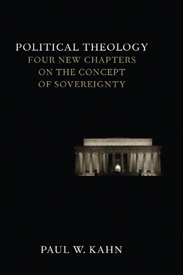Congratulations to Paul Kahn
Humanity editorial board member Paul W. Kahn has recently published a new book.
Here is the description:
In this strikingly original work, Paul W. Kahn rethinks the meaning of political theology. In a text innovative in both form and substance, he describes an American political theology as a secular inquiry into ultimate meanings sustaining our faith in the popular sovereign.
Kahn works out his view through an engagement with Carl Schmitt’s 1922 classic, Political Theology: Four Chapters on the Concept of Sovereignty. He forces an engagement with Schmitt’s four chapters, offering a new version of each that is responsive to the American political imaginary. The result is a contemporary political theology. As in Schmitt’s work, sovereignty remains central, yet Kahn shows how popular sovereignty creates an ethos of sacrifice in the modern state. Turning to law, Kahn demonstrates how the line between exception and judicial decision is not as sharp as Schmitt led us to believe. He reminds readers that American political life begins with the revolutionary willingness to sacrifice and that both sacrifice and law continue to ground the American political imagination. Kahn offers a political theology that has at its center the practice of freedom realized in political decisions, legal judgments, and finally in philosophical inquiry itself.
Here are the endorsements:
“Paul W. Kahn is a distinguished political and legal theorist who has written many important books on the American political imagination before. Yet in this case, he directly engages a thinker with whom he has slowly discovered a philosophical kinship, the great German legal and political theorist Carl Schmitt. The encounter is providential. Quite apart from providing another version of Kahn’s thinking about the nature of American political life, Kahn’s new book offers an extremely original and insightful proposal about what to take away from Schmitt’s project of ‘political theology.’ This is a very attractive and imaginative project, and it is executed with brilliance and provocation.” — Samuel Moyn, Columbia University, author of The Last Utopia: Human Rights in History and coeditor of Democracy Past and Future
“Paul W. Kahn has written a profoundly disturbing book for profoundly disturbing times about the violence of politics and the logic of exception. This new political theology grapples with the subjects that preoccupied Carl Schmitt in his original Political Theology of 1922. Neither simply a commentary nor primarily an interpretation, Kahn’s Political Theology is instead a riff, a structured improvisation on the themes of Schmitt. Kahn recasts Schmitt’s enduring ideas about faith, sacrifice, and the sacred as part of the current political debate over national security and as a reminder of the way that theology threads through secular legality. He probes Schmitt’s enduring appeal as well as the enduring dangers of his ideas at a time when our politics are again defined by existential threats. The new political theology shows us a way to understand both the call and the limits of law in our moment. As regular readers of Kahn’s earlier books will know, no one is better situated to probe these urgent topics.” — Kim Lane Scheppele, Laurance S. Rockefeller Professor of Sociology and Public Affairs in the Woodrow Wilson School and the University Center for Human Values, Princeton University


